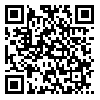Volume 8, Issue 2 (4-2004)
IBJ 2004, 8(2): 95-99 |
Back to browse issues page
Download citation:
BibTeX | RIS | EndNote | Medlars | ProCite | Reference Manager | RefWorks
Send citation to:



BibTeX | RIS | EndNote | Medlars | ProCite | Reference Manager | RefWorks
Send citation to:
Abolhassani M, Darabi H. Partial Purification of a Potent Immunosuppressive Factor Excreted from Leishmania major Promastigote and Amastigote. IBJ 2004; 8 (2) :95-99
URL: http://ibj.pasteur.ac.ir/article-1-518-en.html
URL: http://ibj.pasteur.ac.ir/article-1-518-en.html
Abstract:
Recent scientific evidence indicates that distinct patterns of susceptibility in BALB/c mice to Leishmania major infection are attributable to the differential expansion of distinct CD4+ T-cell subsets and their cytokines production. Production of the Th1 cytokine IFN-g is associated with resistance, whereas production of the Th2 cytokines IL-4 and IL-10 are associated with extreme susceptibility. The major host immune defense mechanism against Leishmania is activation of macrophages by INF-γ derived from T cells. The inability of susceptible hosts to mount the immune response necessary to activate macrophage and destroy the parasites may be due to the parasite-specific proteins that are able to suppress the immune system. In the present study, we have semi-purified the excreted antigens of Leishmania major promastigote and amastigote by column chromatography. The isolated fraction showed a potent immunosuppressive activity on normal BALB/c mice lymphocytes stimulated with mitogens. Fifteen microgram of the isolated fraction caused 81% suppression of lymphocyte proliferation. These data may suggest that the parasite by secreting immunosuppressive factor down regulate the immune system and as a result survive in the body
Type of Study: Full Length/Original Article |
| Rights and permissions | |
 |
This work is licensed under a Creative Commons Attribution-NonCommercial 4.0 International License. |







.png)
